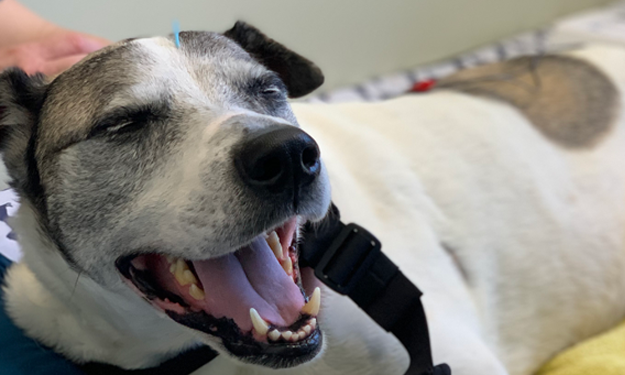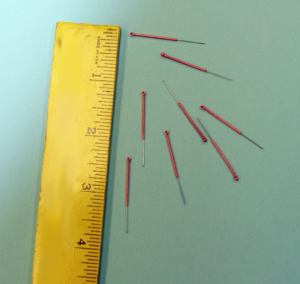Veterinary Acupuncture: How it Helps Pets

Acupuncture, as a part of Traditional Chinese Medicine (TCM), has been used to treat diseases in both humans and animals for several centuries, dating back to 2700 BCE. Despite this long tradition in Eastern cultures, acupuncture has only gained popularity among Western-trained medical doctors since the late 1970s. This slow integration is likely due to the clash between the metaphorical approach to the body and disease taken by the ancient Chinese and the hard science of Western medicine.
East Meets West: An Integrated Approach Using Old Medicine
In comparison to conventional Western medicine, Traditional Chinese Medicine (TCM) assesses the individual in a holistic sense when diagnosing a patient’s disease or painful state. In veterinary medicine, blood tests and diagnostic imaging of different body parts along with an accurate TCM diagnosis also depends on subtle changes in the pet’s behavior and daily habits to reveal the underlying disease.
 Yin & Yang
Yin & Yang
In order to appreciate the perspective of TCM, one must understand the concept of Yin and Yang. The Yang represents the hot, light, external and exuberant aspects of the body and the Yin represents the cold, dark, internal and restorative aspects of the body. Yin and Yang are relative descriptive terms that apply to all aspects of the body and the world, including different behaviors, areas of the body, times of day, and others. In the same sense that a “left side” only exists with a “right side”, the Yang can only exist with consideration of the Yin. According to TCM theory, pain or disease is the clinical manifestation of an imbalance of the Yinand Yangwithin the body, where there is too much or too little of either force.
Blood & Qi
In TCM, there are two important substances that are circulated around the body – Blood and Qi (pronounced Chee), the imperceptible form of energy that gives the body life. The varied internal organs are responsible for generating these substances and distributing them around the body. Blood and Qi travel throughout the body by a channel network system, similar to the arteries and veins well described in Western medicine. This network is composed of various “meridians”, like interstate highways, located just under the skin along external surface of the body. An obstruction in a meridian that impairs the flow of Blood or Qi is very similar to a road block and creates an area of pain. An acupuncturist is able to access these channels by inserting an acupuncture needle into specific points along these meridians, allowing them to restore the flow of Blood and Qi while also influencing the internal organs themselves.
How Does Acupuncture Work in Pets?
 Acupuncture has been successfully used for several centuries by the ancient Chinese to treat a multitude of diseases. However, the metaphorical explanations of the TCM theory has not satisfied Western-trained scientists in describing the underlying mechanisms of acupuncture treatments. A series of research projects have since been performed and have revealed that acupuncture likely acts in multiple ways.
Acupuncture has been successfully used for several centuries by the ancient Chinese to treat a multitude of diseases. However, the metaphorical explanations of the TCM theory has not satisfied Western-trained scientists in describing the underlying mechanisms of acupuncture treatments. A series of research projects have since been performed and have revealed that acupuncture likely acts in multiple ways.
Acupuncture can help to alleviate acute and chronic pain in many pets. The placement of needles at specific places along the meridians likely triggers changes in the spinal cord and in the brain that reduce the perception of pain. Additionally, a specific needle technique can also be used to release focal muscle spasms, often called muscle knots, which are often implicated in patients with back pain.
Acupuncture also improves wound healing by increasing local blood flow to tissues in many dogs and cats. Current theory suggests that the insertion of an acupuncture needle triggers a microscopic trauma, leading to a release of inflammatory signals by cells in the region which ultimately increases the blood flow to the area.
Should My Pet Get Acupuncture?
There are many pets that could benefit from acupuncture treatment. Acupuncture has had positive results in pets suffering from neurologic disease, chronic arthritis, chronic intestinal disease, non-healing wounds, dermatologic disorders and a multitude of other ailments.
Pain Management in Pets
While acupuncture can be used in pets with cancer, it should be reserved solely as palliative treatment for pain. As acupuncture has been shown to increase blood flow, it is possible that acupuncture therapy can result in further tumor growth. However, it can be utilized after the tumor has been removed to improve wound healing and bolster the immune defenses against recurrence.
Evaluation & Treatment
An acupuncturist will typically evaluate your pet in an initial consultation that examines many facets of your pet’s lifestyle, behavior, and medical conditions. After arriving at a TCM diagnosis, a typical treatment schedule will include weekly treatments for the first 4-6 weeks with a gradual taper of treatments to once per month or every other month until the condition is resolved. While acupuncture may not heal all conditions in every patient, such an integrative strategy with conventional Western medicine maximizes the benefits of both medical philosophies.